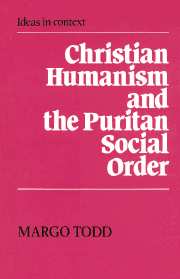Book contents
- Frontmatter
- Contents
- preface
- Abbreviations
- 1 Introduction: The demythologizing of puritanism
- 2 Christian humanism as social ideology
- 3 The transmission of Christian humanist ideas
- 4 The spiritualized household
- 5 Work, wealth and welfare
- 6 Conscience and the Great Chain of Being
- 7 The conservative reaction: Trent, Lambeth and the demise of the humanist consensus
- Bibliography
- Index
1 - Introduction: The demythologizing of puritanism
Published online by Cambridge University Press: 06 July 2010
- Frontmatter
- Contents
- preface
- Abbreviations
- 1 Introduction: The demythologizing of puritanism
- 2 Christian humanism as social ideology
- 3 The transmission of Christian humanist ideas
- 4 The spiritualized household
- 5 Work, wealth and welfare
- 6 Conscience and the Great Chain of Being
- 7 The conservative reaction: Trent, Lambeth and the demise of the humanist consensus
- Bibliography
- Index
Summary
The historiographical problem of puritanism has now reached epic proportions. While some historians carry on the old debate about precisely what constellation of beliefs constitutes ‘puritanism’, others now question whether the concept exists at all. While some go on to attach the puritan label even to bishops, others are able to talk about people traditionally regarded by everyone as puritans without even using the word. The most extreme revisionists deny that either puritans or puritanism had anything to do with the conflict of the 1640s; others, however, have resurrected the notion of a Puritan Revolution. While advocates of the latter view find elements of radicalism in puritan thought, others have shown puritans to have been upholders of the established order in church and state.
The debate during the past decade has been intense and sometimes bitter, and resolution of some of the most basic questions seems as illusory as ever.
Fortunately, however, the historiographic conflict has not been without positive results. It has managed to bring us closer to understanding who puritans were and how they acted. Even those historians who have ceased using the term still talk about the people who we have always thought were puritans and have taught us a good deal about them. As the polemical dust clears, it is becoming evident that some old and weakly-founded constructs have been quite properly demolished, and new interpretations based on manuscript evidence and the discoveries of local historians have been erected to good effect.
- Type
- Chapter
- Information
- Christian Humanism and the Puritan Social Order , pp. 1 - 21Publisher: Cambridge University PressPrint publication year: 1988



